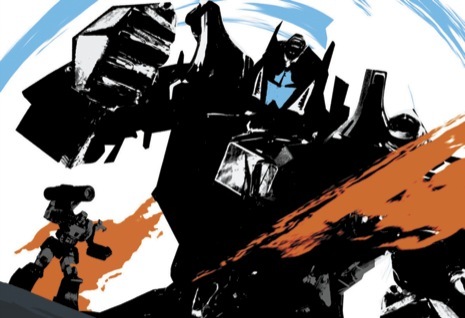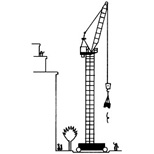The opening scene of Michael Bay’s “Transformers” takes place in deep space. Out of the darkness comes a voice that is deeper still. It makes Barry White sound like a countertenor, and this is what it says: “Before time began, there was the Cube.” Hello? Mr. Rubik?
The film that ensues is acrylically bright, and the only way to match its median sound level would be to blow up a trombone factory, yet what descended on me in that first scene was a wintry pall of mystification. It never really lifted, but then I never collected small, twisted pieces of vehicular weaponry in the mid-nineteen-eighties, or watched the animated TV series that followed, and thus it is not to me that Bay is exposing his innermost soul. Transformers, as any parent who has ever bruised a heel on Bonecrusher can tell you, were a line of toys that could, given sufficient wrenching, be turned from cars and planes into robots and back again. Nowadays, we would call this recycling, but at the climax of the Cold War it felt more like eternal readiness. You could sit moodily in the back of your parents’ Pontiac Sunbird and imagine cruise missiles bursting out of the headlamps.
Now these delightful objets d’art have a movie to themselves. We should not be surprised. Long ago, when the impact of “Star Wars” was beefed up by a line of merchandise, some of us noticed that the five-inch Lukes and Leias possessed a depth and mobility that was denied to their onscreen counterparts, and, decades later, we have reached the reductio ad absurdum of that rivalry: rather than spin the toys off from the movie, why not build the movie from the toys? “Transformers” is not the first effort in this direction; I distinctly remember finding a couchful of children enraptured by a DVD of “Barbie of Swan Lake” and realizing that Ingmar Bergman’s “Persona” had not, after all, signalled the final disintegration of human personality. Bay’s movie, however—as befits the bringer of “The Rock,” “Armageddon,” and “Pearl Harbor”—is the grandest proof so far that, when it comes to movie characterization, flesh and blood have had their chance. From here on, it’s up to metal and plastic.
There are two types of Transformers: the Autobots, who are fine, upstanding citizens in pretty colors, and the Decepticons, most of whom are mean, vengeful, and beige. The quarrel between the two sides began on their home planet. For the purposes of the movie, however, they duke it out on ours. One of the Decepticons disguises itself as a helicopter and trashes an American military base in Qatar; another pretends to be a boom box (who still has one of those?) and stows away on Air Force One. Their target is a slender naïf named Sam Witwicky (Shia LaBeouf), a teen-ager who happens to hold the key to the universe or some such useless item. Fortunately, his car, a trusty yellow Camaro, is in fact a saintly Autobot that has been sent to protect him. This shield-the-kid plot is pilfered from “Terminator 2,” and there are matching nods to “Godzilla” and the recent “King Kong,” but, if you really want to know what “Transformers” feels like, think of a hundred-and-thirty-five-minute, hundred-and-fifty-million-dollar retread of “Herbie Goes Bananas.”
The spectacle of life and feeling being vested in the inanimate is as old as cinema itself, and you could argue that it peaked early, in 1927, with the slowly opening eyes of the robot in “Metropolis.” The latter was a woman, which is more than “Transformers” can muster—there’s not a Femitron, or what Bay would presumably call a Chickibot, in sight, and we are left to wonder how, why, and via what stimulation his mounds of scrap metal might reproduce. “These things just don’t die,” a soldier says, which raises the question of whether they ever just live. Certainly, the director can’t decide on their level of moral sophistication; early on, they seem merely aggressive and willful, not unlike a real Camaro, but then suddenly the Autobots—led by Optimus Prime, whose name suggests an ambitious, moist-palmed young curate out of Trollope—begin gushing sermons like oil. “Freedom is the right of all sentient beings,” Optimus declares, shortly before he and Megatron, his opposite number, start cartwheeling through major conurbations. Personally, I tend to feel less, not more, sentient when a pair of battling robots lands on my desk, but that’s just me.
In previous movies, Michael Bay dabbled wearily in Homo sapiens. At last he has summoned the courage to admit that he has an exclusive crush on machines, and I congratulate him on creating, in “Transformers,” his first truly honest work of art. Not that he needs my plaudits; as a passerby exclaims in the midst of the film, “This is easily a hundred times cooler than ‘Armageddon’!” To be proud of your achievement is one thing, but to plant film critics inside your movie and review it favorably as you go along: that takes genius. Where it leaves real critics—rusty old Concepticons, with failing firepower—I hate to think.
What does Michael Bay have in common with Werner Herzog? What links the showman behind “Transformers” with the maker of “Fitzcarraldo,” “Aguirre, Wrath of God,” and other excursions into savagery and silence? The answer lies in a charge that Herzog has levelled at himself: “I am someone who takes everything very literally. I simply do not understand irony.” Neither man is embarrassed by this lack, but, while it has helped to unbridle Bay and send him galloping into bombast, Herzog has been left to browse among the eccentrics and daydreamers who populate his films. To him, indeed, they are the opposite of eccentric; Kaspar Hauser, the hero of “Every Man for Himself and God Against All” (1974), is raised like a beast in a stall, and yet, as the director says, “he is at the center.”

























